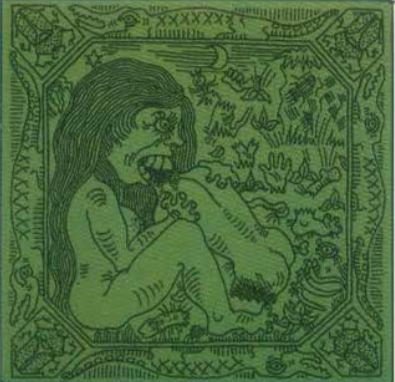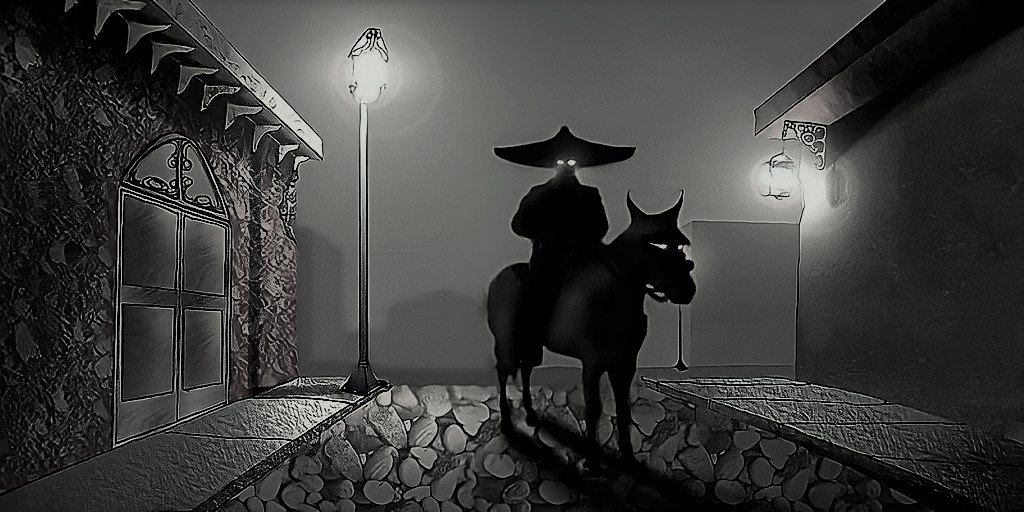The Royal Printers of The Wicked Bible
Regardless of your beliefs, there’s no denying the Christian Bible has been pretty important for a lot of people for a really long time. Due to its importance, it’s no surprise that a King in the 17th century feared what messages it sent. If the King wanted to change it, those who reprinted it had to be extra careful.
These days if you make a mistake on a document of significant importance you would simply hit the ‘Back Space’ key on your keyboard. No one would ever know and there certainly wouldn’t be any record of tit it.
But back in the early days of the printing press, a mistake could cost you everything and even create something wicked.
Pretend this is scary…
The Barkers: A Royal Printing Monopoly
Unlike today, if you wanted to print something in the 16th century you needed a large mechanical device known as a printing press. Usually reaching 10 feet tall and 7 feet long, these devices were cumbersome, to say the least, so it wasn’t like everyone had one lying around.
Enter Christopher Barker, a wealthy businessman who owned at least 5 printing presses and decided to shake up the bible industry in England. It wouldn’t be easy though, as the printing of bibles was usually left to Queen Elizabeth’s Royal Printer; that’s an official boring title.
Through his connections and “donations”, in 1575 Christopher was granted the privilege to print the first complete edition of the Geneva Bible in English. After its release in 1576, it was a huge success due to its detailed illustrations, study notes in the margins, excellent presswork, lack of typos, and the choice to use Roman typeface instead of the common Blackletter font, today usually known as the Gothic font.
“Surprisingly I preferred the Gothic font.”
Meanwhile, Richard Jugge, the Queen’s Royal Printer who only had the privilege of printing the Bishop Bible version, was angry that Barker was entering the market with his new fancy Geneva bible and cutting into his profits.
See, having the title of ‘Royal Printer’ meant you were paid a salary to be the only person who could print proclamations, statutes, and acts decreed by the Queen, but bibles weren’t part of that deal. You still needed to be granted that patent by the Queen’s Clerk of the Privy Council. Once you had it, you could print bibles and make extra money from selling them but you could only print the specific version granted.
By the way, patents back then were widely different from today. Having the patent in the 16th century in no way made you the owner of the bible, it just meant you were the only one who could print that version of it. The only exceptions to this exclusivity rule were the Universities of Cambridge and Oxford.
After Barker’s success with the Geneva Bible, in 1576 Richard Jugge approached him and essentially told him to stay away from the Bishop Bible. It seemed like Richard Jugge was at the precipice of starting a biblical rivalry.
Then he died.
After Richard Jugge’s death in 1577, Christopher Barker set his eyes on the job of Royal Printer and the patents. Except, he didn’t just want the patent for the Bishop bible or a future version, he wanted an exclusive patent for anything and everything needing printing by the Queen, present, and future. Christopher Barker wanted a monopoly.
And he got it.
It just took some more ‘donations’.
Transitions of Power
In 1588, Barker purchased an upgrade to his patents and job allowing it to be passed onto his eldest son, Robert, upon his death. That’s right, he purchased a dynasty pass for his job because life has always been pay-to-win.
With his exclusive copyrights/patents, Christopher was a ruthless businessman and introduced the act of receiving royalties for every bible sold. He ruled the bible industry with an iron fist, usually sending out his own deputies to stop anyone from selling ‘unlicensed’ versions of the bible. He even tried to prevent the University of Cambridge from printing the bible.
But, the start of the 17th century saw a lot of changes; not just for the monarchy, but also for the Royal Printer. Queen Elizabeth passed away, naming wannabe witch/demon hunter King James VI of Scotland as her successor. Christopher Barker also passed away in 1599, which transferred his Royal Printer title to his son, Robert.
Compared to his father, Robert Barker wasn’t a great businessman nor was he as meticulous but, he still wanted to make a real name for himself. Luckily for him, that opportunity wouldn’t take long to manifest.
Related Article: Is the Curse of Macbeth Real?
The King James Bible
When King James took up the throne in 1603, he was immediately met with a problem. The Puritans, members of a group who wanted to reform the Church of England, presented him with a list of grievances they had with the Church of England.
See, for most of the 16th century, England had gone back and forth between being a Catholic country and a Protestant one. There was also the ‘little’ issue of King Henry VIII’s, Act of Supremacy in 1534, wherein he named himself the ‘Supreme Head of the Church of England’, thereby breaking away from Rome and the Catholic Pope.
During Queen Elizabeth’s rule, in order to appease both Catholics and Protestants, she enforced the Protestant religion while allowing pieces of Catholicism to bleed in. At the same time, she still maintained the idea of the Act of Supremacy but called herself the ‘Supreme Governor of the English Church’ instead… because that was definitely different.
“Look if we change the name and nothing else, people will think it’s different.”
Despite Queen Elizabeth’s efforts, the Puritans didn’t like Catholicism mixing in with their Protestant religion so their list of issues to King James in 1603 mostly focused on ways to correct this. While King James was receptive he also had his own issues on the matter.
Fully accepting Protestant views would mean he could no longer be the “Supreme Head of the English Church” and he wasn’t about to give up that power. On top of this, King James disliked the Geneva Bible for its more Puritan views/language. He feared the popularity of the bible would cause people to question his ‘divine right’.
Due to those fears, King James wanted to commission a new bible that removed any text that may fuel threats to his authority. For example; the marginal notes in Exodus 1:19 of the Geneva Bible called the disobedience of midwives towards the Pharaoh, “lawful”. This had to be removed as readers may interpret this as the bible saying disobedience towards rulers might be justified at times.
Between 1604 and 1610 King James gathered 54 biblical scholars from the Church of England and tasked them with writing a new bible using the text from the Bishop Bible as a guide. If they ran into issues they were allowed to use other bibles from a pre-approved list. Regardless the new text had to follow King James’ instructions of being more accepting of the King’s divine right.
“The bible says, ‘And God was totally besties with King James I’, sounds legit.”
Printing the Wicked Bible
Printing the King James Bible fell onto Robert Barker who poured all his money into it. In order to cover the cost, he ended up leasing out portions of his patents to two other printers, Bonham Norton and John Bill. Once printed in 1611, the King James Bible was known as the Authorized Bible as it was the only bible authorized to be read in churches.
Unfortunately for Robert Barker and the King, the bible didn’t sell too well and it wasn’t hard to see why. The Authorized Bible had no illustrations, went back to using Blackletter font, had no study notes in the margins, used more Latin than the Geneva Bible, and contained plenty of typos.
Everyone’s reaction to reading the Authorized Bible
Robert Barker spent the next several years printing new editions which addressed some of these issues but, all that cost money and he slowly went into debt.
Then things got worse. In 1631 Robert, now working with another Royal Printer, Martin Lucas, printed yet another edition which corrected some typos but they inadvertently created one of the worst typos in history.
Exodus Chapter 20 of the bible lists the ten commandments, as delivered by God himself, so one can assume they’re pretty important. Usually, Exodus 20:14 states “Thou shalt not commit adultery” meaning you shouldn’t have sex with someone who is not your spouse.
BUT, in the Authorized Bible of 1631, Robert Barker accidentally left out the word ‘not’ and of all the words you could leave out in that sentence; I would place ‘not’ in the top two, probably even the top one.
If that wasn’t bad enough, this reprint of the bible wasn’t only cool with adultery but also had another misprint. In Deuteronomy Chapter 5 instead of “...Behold, the Lord our God hath shewed us his glory and his greatnasse…”, it read “Behold, the Lord our God hath shewed us his glory and his great-asse…”
Now to be fair, at the time ‘ass’ only meant donkey, there is no possible way anyone back then could have ever known that ‘ass’ would one day refer to, the much funnier, rear-end.
No one could have known…
Aftermath
So, this adultery-approving ass bible gets printed, and while I’m sure people noticed, the word doesn’t get to the higher-ups in the Church of England until the following year. By now King James I had passed away and his son, King Charles was in charge… and he was not happy.
All copies of, what would eventually be known as the Wicked Bible were ordered to be burned. Many were still unsold but the ones that had been in the preceding year were recalled to great success.
Out of the thousand copies that were printed, there are said to be anywhere between 11 and 16 still in existence today. Unfortunately, the ones that do exist do not have the ‘ass’ misprint or they have the dash in ‘great-asse’ covered by an inkblot in order to cover up the mistake.
As for Robert Barker and Martin Lucas, both were fined 300 pounds and stripped of their Royal Printer status. This meant the unprecedented printing monopoly created by Christopher Barker, was lost within one generation.
According to the book, A Short History of English Printing, which at 300 pages is not short and just as riveting as you expect it to be, Robert and Martin were also mandated to print a book written by the Archbishop of Canterbury, William Laud, on a yearly basis in Greek. All the costs had to be paid out of their own pockets.
Remember when I said Robert was already in debt in 1611 and that the Authorized Bible didn’t sell well? Well, add in a bunch of legal issues with the patents he leased out plus the Wicked Bible issue and you end up with Robert Barker in a debtor’s prison in 1635. He stayed there until his death in 1643.
Can’t make typos in here.
As for England, it’s no surprise that the King adjusting the wording of the bible only increased tensions between the Puritans and the Church of England. This eventually contributed to the breakout of civil wars in the 1640s.
As for the bibles, the Wicked Bible is worth around $50k-$100K today, the Geneva Bible fell out of favor after the Civil Wars due to it being viewed as containing Puritan views, and the Authorized Bible which became more commonly known as the King James Bible was, until recently, the most popular translation.
And that’s the story of the Royal Printer who lost everything, the scared King who changed the bible, and the bible that was cool with your sins.
Quick Facts
While the Wicked Bible printed by Robert Barker includes one of the most well-known typos, there have been multiple bibles with typos prior and after. These bibles are known as Bible errata.
A few examples of Bible errata are:
The “Wife-Beater Bible” from 1549 includes a footnote reading “...if she be not obediente and healpeful unto hym, endevoureth to beate the fere of God into her heade…”
Rough Translation: If she’s not doing what you say, why not make her fear God by bashing her head in?
The “Sin On Bible” of 1716 states “sin on more” instead of “sin no more”
And even another bible called “The Wicked Bible” sometimes “The Unrighteous Bible” from 1653 printed by Cambridge which states “Know ye that the unrighteous shall inherit the kingdom of God?”
Instead of “Know ye not that the unrighteous shall inherit the kingdom of God?”
It’s often said that King James I banned the Geneva Bible in 1611 but that’s not entirely true. King James banned new printings of the Geneva Bible and banned it from being read in churches. Those who owned the Geneva Bible were not required to burn it or get rid of it like the Wicked Bible



















